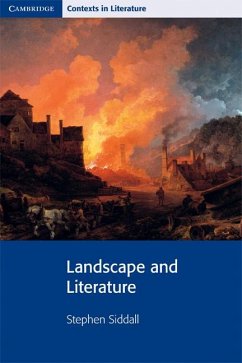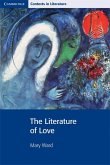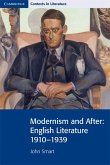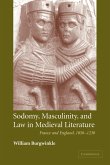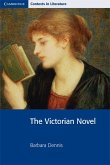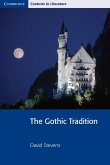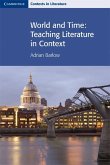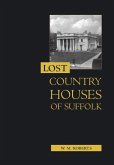Stephen Siddall
Landscape and Literature
Stephen Siddall
Landscape and Literature
- Broschiertes Buch
- Merkliste
- Auf die Merkliste
- Bewerten Bewerten
- Teilen
- Produkt teilen
- Produkterinnerung
- Produkterinnerung
Critical introductions to a range of literary topics and genres.
Andere Kunden interessierten sich auch für
![The Literature of Love The Literature of Love]() Mary WardThe Literature of Love27,99 €
Mary WardThe Literature of Love27,99 €![Modernism and After Modernism and After]() John SmartModernism and After27,99 €
John SmartModernism and After27,99 €![Sodomy, Masculinity and Law in Medieval Literature Sodomy, Masculinity and Law in Medieval Literature]() William E. Burgwinkle (University of Cambridge)Sodomy, Masculinity and Law in Medieval Literature35,99 €
William E. Burgwinkle (University of Cambridge)Sodomy, Masculinity and Law in Medieval Literature35,99 €![The Victorian Novel The Victorian Novel]() Barbara DennisThe Victorian Novel28,99 €
Barbara DennisThe Victorian Novel28,99 €![The Gothic Tradition The Gothic Tradition]() John SmartThe Gothic Tradition28,99 €
John SmartThe Gothic Tradition28,99 €![World and Time World and Time]() Adrian BarlowWorld and Time28,99 €
Adrian BarlowWorld and Time28,99 €![Lost Country Houses of Suffolk Lost Country Houses of Suffolk]() W. M. RobertsLost Country Houses of Suffolk39,99 €
W. M. RobertsLost Country Houses of Suffolk39,99 €-
-
-
Critical introductions to a range of literary topics and genres.
Hinweis: Dieser Artikel kann nur an eine deutsche Lieferadresse ausgeliefert werden.
Hinweis: Dieser Artikel kann nur an eine deutsche Lieferadresse ausgeliefert werden.
Produktdetails
- Produktdetails
- Cambridge Contexts in Literature
- Verlag: Cambridge University Press
- Seitenzahl: 130
- Erscheinungstermin: 21. Mai 2009
- Englisch
- Abmessung: 229mm x 152mm x 7mm
- Gewicht: 202g
- ISBN-13: 9780521729826
- ISBN-10: 0521729823
- Artikelnr.: 26672987
- Herstellerkennzeichnung
- Libri GmbH
- Europaallee 1
- 36244 Bad Hersfeld
- gpsr@libri.de
- Cambridge Contexts in Literature
- Verlag: Cambridge University Press
- Seitenzahl: 130
- Erscheinungstermin: 21. Mai 2009
- Englisch
- Abmessung: 229mm x 152mm x 7mm
- Gewicht: 202g
- ISBN-13: 9780521729826
- ISBN-10: 0521729823
- Artikelnr.: 26672987
- Herstellerkennzeichnung
- Libri GmbH
- Europaallee 1
- 36244 Bad Hersfeld
- gpsr@libri.de
Introduction
1. Approaching landscape and literature: Classical influences
Biblical influences: Eden and expulsion
The garden of love
The greenwood
Elegant shepherds
Symbolic nature
The eighteenth century: the Enlightenment
Towards the Romantics
Confinement and space
Assignments
2. Approaching the texts: Chaucer's landscapes
Shakespeare's landscapes
Marvell's ingenuity
Landscapes for elegy
Landscapes for religion
The country house
Romantic solitude
Landscapes of childhood
The Romantics: the Sublime and the Gothic
Hardy's Wessex
Observation and beyond
Working the land
Desolated land
Ancient and modern
Assignments
3. Texts and extracts: Simon Armitage, from Sir Gawain and the Green Knight
Geoffrey Chaucer, from The Parlement of Foulys
Thomas Carew, 'The Spring', John Clare, from The Shepherd's Calendar
Gerard Manley Hopkins, 'Spring'
John Milton, from Paradise Lost
James Thomson, from The Seasons
Dorothy Wordsworth, from her Journals
Jane Austen, from Sense and Sensibility
Percy Bysshe Shelley, from 'Monte Blanc'
Matthew Arnold, from 'The Scholar Gipsy'
George Eliot, from The Mill on the Floss
John Steinbeck, from The Grapes of Wrath
Thomas Hardy, from Tess of the D'Urbervilles
D.H. Lawrence, from The Rainbow
Edmund Blunden, from Undertones of War
Stella Gibbons, from Cold Comfort Farm
T.S. Eliot, from The Four Quartets
Richard Wilbur, 'Year's End'
William Golding, from Free Fall
Angela Carter, from 'The Erl-King'
Ted Hughes, from Tales from Ovid
4. Critical approaches: Political approaches
Feminist approaches
Ecological approaches
Assignments
5. How to write about landscape and literature: Responding to a poem
Responding to prose
Comparison
Preparing to write about a topic
Writing about the topic
Assignments
6. Resources: Further reading
Media resources: film and television
Websites
Glossary
Index
Acknowledgements.
1. Approaching landscape and literature: Classical influences
Biblical influences: Eden and expulsion
The garden of love
The greenwood
Elegant shepherds
Symbolic nature
The eighteenth century: the Enlightenment
Towards the Romantics
Confinement and space
Assignments
2. Approaching the texts: Chaucer's landscapes
Shakespeare's landscapes
Marvell's ingenuity
Landscapes for elegy
Landscapes for religion
The country house
Romantic solitude
Landscapes of childhood
The Romantics: the Sublime and the Gothic
Hardy's Wessex
Observation and beyond
Working the land
Desolated land
Ancient and modern
Assignments
3. Texts and extracts: Simon Armitage, from Sir Gawain and the Green Knight
Geoffrey Chaucer, from The Parlement of Foulys
Thomas Carew, 'The Spring', John Clare, from The Shepherd's Calendar
Gerard Manley Hopkins, 'Spring'
John Milton, from Paradise Lost
James Thomson, from The Seasons
Dorothy Wordsworth, from her Journals
Jane Austen, from Sense and Sensibility
Percy Bysshe Shelley, from 'Monte Blanc'
Matthew Arnold, from 'The Scholar Gipsy'
George Eliot, from The Mill on the Floss
John Steinbeck, from The Grapes of Wrath
Thomas Hardy, from Tess of the D'Urbervilles
D.H. Lawrence, from The Rainbow
Edmund Blunden, from Undertones of War
Stella Gibbons, from Cold Comfort Farm
T.S. Eliot, from The Four Quartets
Richard Wilbur, 'Year's End'
William Golding, from Free Fall
Angela Carter, from 'The Erl-King'
Ted Hughes, from Tales from Ovid
4. Critical approaches: Political approaches
Feminist approaches
Ecological approaches
Assignments
5. How to write about landscape and literature: Responding to a poem
Responding to prose
Comparison
Preparing to write about a topic
Writing about the topic
Assignments
6. Resources: Further reading
Media resources: film and television
Websites
Glossary
Index
Acknowledgements.
Introduction
1. Approaching landscape and literature: Classical influences
Biblical influences: Eden and expulsion
The garden of love
The greenwood
Elegant shepherds
Symbolic nature
The eighteenth century: the Enlightenment
Towards the Romantics
Confinement and space
Assignments
2. Approaching the texts: Chaucer's landscapes
Shakespeare's landscapes
Marvell's ingenuity
Landscapes for elegy
Landscapes for religion
The country house
Romantic solitude
Landscapes of childhood
The Romantics: the Sublime and the Gothic
Hardy's Wessex
Observation and beyond
Working the land
Desolated land
Ancient and modern
Assignments
3. Texts and extracts: Simon Armitage, from Sir Gawain and the Green Knight
Geoffrey Chaucer, from The Parlement of Foulys
Thomas Carew, 'The Spring', John Clare, from The Shepherd's Calendar
Gerard Manley Hopkins, 'Spring'
John Milton, from Paradise Lost
James Thomson, from The Seasons
Dorothy Wordsworth, from her Journals
Jane Austen, from Sense and Sensibility
Percy Bysshe Shelley, from 'Monte Blanc'
Matthew Arnold, from 'The Scholar Gipsy'
George Eliot, from The Mill on the Floss
John Steinbeck, from The Grapes of Wrath
Thomas Hardy, from Tess of the D'Urbervilles
D.H. Lawrence, from The Rainbow
Edmund Blunden, from Undertones of War
Stella Gibbons, from Cold Comfort Farm
T.S. Eliot, from The Four Quartets
Richard Wilbur, 'Year's End'
William Golding, from Free Fall
Angela Carter, from 'The Erl-King'
Ted Hughes, from Tales from Ovid
4. Critical approaches: Political approaches
Feminist approaches
Ecological approaches
Assignments
5. How to write about landscape and literature: Responding to a poem
Responding to prose
Comparison
Preparing to write about a topic
Writing about the topic
Assignments
6. Resources: Further reading
Media resources: film and television
Websites
Glossary
Index
Acknowledgements.
1. Approaching landscape and literature: Classical influences
Biblical influences: Eden and expulsion
The garden of love
The greenwood
Elegant shepherds
Symbolic nature
The eighteenth century: the Enlightenment
Towards the Romantics
Confinement and space
Assignments
2. Approaching the texts: Chaucer's landscapes
Shakespeare's landscapes
Marvell's ingenuity
Landscapes for elegy
Landscapes for religion
The country house
Romantic solitude
Landscapes of childhood
The Romantics: the Sublime and the Gothic
Hardy's Wessex
Observation and beyond
Working the land
Desolated land
Ancient and modern
Assignments
3. Texts and extracts: Simon Armitage, from Sir Gawain and the Green Knight
Geoffrey Chaucer, from The Parlement of Foulys
Thomas Carew, 'The Spring', John Clare, from The Shepherd's Calendar
Gerard Manley Hopkins, 'Spring'
John Milton, from Paradise Lost
James Thomson, from The Seasons
Dorothy Wordsworth, from her Journals
Jane Austen, from Sense and Sensibility
Percy Bysshe Shelley, from 'Monte Blanc'
Matthew Arnold, from 'The Scholar Gipsy'
George Eliot, from The Mill on the Floss
John Steinbeck, from The Grapes of Wrath
Thomas Hardy, from Tess of the D'Urbervilles
D.H. Lawrence, from The Rainbow
Edmund Blunden, from Undertones of War
Stella Gibbons, from Cold Comfort Farm
T.S. Eliot, from The Four Quartets
Richard Wilbur, 'Year's End'
William Golding, from Free Fall
Angela Carter, from 'The Erl-King'
Ted Hughes, from Tales from Ovid
4. Critical approaches: Political approaches
Feminist approaches
Ecological approaches
Assignments
5. How to write about landscape and literature: Responding to a poem
Responding to prose
Comparison
Preparing to write about a topic
Writing about the topic
Assignments
6. Resources: Further reading
Media resources: film and television
Websites
Glossary
Index
Acknowledgements.

